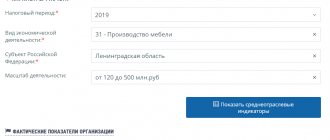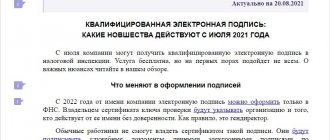Desk inspection
As part of a desk tax audit, the inspectorate can only control the period for which the organization filed a declaration or calculation, including an updated one (clause 1 of Article 88 of the Tax Code of the Russian Federation). This means that if an organization has submitted a VAT return to the inspectorate for the second quarter of 2015, then as part of a desk audit of the submitted declaration, the inspection can check the correctness of the calculation of this tax only for the second quarter of 2015. At the same time, to carry out the inspection, the inspection has the right to use data from other reporting periods.
Situation: is it possible to cancel the inspection decision based on the results of a desk audit? Based on the results of the inspection, the inspection made conclusions that were not related to the period for which the declaration (calculation) was submitted.
Answer: yes, it is possible, in terms of those conclusions that relate to periods that are not subject to desk audit.
As part of a desk audit, the inspection can only control the period for which the organization filed a declaration or calculation (clause 1 of Article 88 of the Tax Code of the Russian Federation). Deviation from this period will be a violation on the part of the inspectorate. Therefore, the inspection decision based on the results of the desk audit is subject to cancellation in that part of the findings that relate to periods not subject to inspection. In arbitration practice there are examples of court decisions confirming the legitimacy of this conclusion (see, for example, the decision of the Supreme Arbitration Court of the Russian Federation dated February 17, 2009 No. 1437/09, resolution of the Federal Antimonopoly Service of the Ural District dated October 21, 2008 No. F09-7599/08-S2 , East Siberian District dated August 27, 2007 No. A58-6343/06-F02-5686/2007, Northwestern District dated March 5, 2007 No. A56-16972/2006).
On-site inspection
As part of an on-site tax audit, the inspectorate can monitor any periods. As a general rule, these periods should not extend beyond the three calendar years preceding the year in which the decision to conduct an on-site inspection was made. This follows from the provisions of paragraph 2 of paragraph 4 of Article 89 of the Tax Code of the Russian Federation. Specific periods of on-site inspections must be indicated in the inspectorate’s decision to conduct an inspection (paragraph 7, paragraph 2, article 89 of the Tax Code of the Russian Federation).
A similar approach to determining periods of on-site inspections also applies in cases where the inspection conducts:
- repeated on-site inspection in order to control a higher tax authority over a lower one (paragraph 3, clause 10, article 89 of the Tax Code of the Russian Federation);
- on-site inspection in connection with the reorganization or liquidation of an organization (clause 11 of article 89 of the Tax Code of the Russian Federation).
A special period of on-site inspection is provided if the inspection conducts:
- initial on-site inspection in connection with the organization’s filing of an updated declaration. In this case, the inspectorate can check the period for which the updated declaration was filed, even if the specified period exceeds three years (paragraph 3, paragraph 4, article 89 of the Tax Code of the Russian Federation, letter of the Federal Tax Service of Russia dated May 29, 2012 No. AS- 4-2/8792);
- repeated on-site inspection in connection with the filing by the organization of an updated declaration with the amount of tax to be reduced. In this case, the inspectorate can check not any period within the three-year limit, but only the one for which the clarification was submitted (subclause 2, clause 10, article 89 of the Tax Code of the Russian Federation);
- on-site inspection of an organization that applies a special regime when executing an agreement on the division of property. In this case, the inspectorate can check any periods during the entire validity period of the specified agreement, even if the agreement came into force three years ago or earlier (clause 1 of Article 346.42 of the Tax Code of the Russian Federation);
- on-site inspection of a resident excluded from the register of residents of a special economic zone in the Kaliningrad region. If this inspection concerns income tax and (or) property tax and the decision to conduct it is made no later than three months from the date of payment of the relevant tax, then the inspectorate can check any periods without any year restrictions (paragraph 5, paragraph 10 Article 288.1, paragraph 5, paragraph 7, Article 385.1 of the Tax Code of the Russian Federation);
- on-site inspection of a participant in a regional investment project. In this case, the tax office may audit the five-year period preceding the year in which the decision to conduct the audit was made. But in order to take advantage of this opportunity, it is necessary that the period for capital investments established by the regional project be five years from the date the organization is included in the register of participants in regional investment projects (clause 2 of Article 89.2 of the Tax Code of the Russian Federation).
Tax audit for more than three years
Yulia Vasilyeva, head of the group for accreditation of foreign missions
Tax audit for more than three years
In a number of cases, the law allows for the possibility of conducting inspections and holding people accountable for violations of the law, even if the period subject to control as part of an on-site tax audit exceeds three calendar years.
Article 87 of the Tax Code of the Russian Federation provides that in order to monitor compliance by a taxpayer, fee payer or tax agent with the legislation on taxes and fees, tax authorities have the right to conduct on-site and desk audits.
Clause 1 of Art. 88 of the Tax Code of the Russian Federation states that within the framework of a desk audit, the period specified in the declaration submitted by the taxpayer and the documents submitted by the taxpayer is subject to control.
The period subject to control as part of an on-site inspection is established by clause 4 of Art. 89 Tax Code of the Russian Federation. It should not exceed three calendar years preceding the year in which the decision to conduct the inspection was made, unless otherwise provided by Art. 89 Tax Code of the Russian Federation.
In this article, we propose to consider those “other” cases in which the tax authorities have the right to control the correctness of calculation and timely payment of taxes for periods exceeding the established three years from the date of the decision to conduct an on-site audit.
Example
The decision to conduct an on-site tax audit of X LLC was made on December 29, 2012. The taxpayer received this decision on January 11, 2013. What limits can be set for the period subject to control by the tax authority within the framework of this on-site tax audit? According to the literal interpretation of paragraph 4 of Art. 89 of the Tax Code of the Russian Federation, tax authorities have the right to check the correctness of calculation and timely payment of taxes by the taxpayer of LLC “X” for the period starting from January 1, 2009.
Please note that the fact that the decision to conduct an audit was received by the taxpayer not in the year in which it was made, but in the following year, does not in any way affect the three-year limitation period subject to verification.
This conclusion is confirmed by materials of judicial practice (resolution of the Federal Antimonopoly Service of the North-Western District dated June 22, 2012 No. A05-14239/2010).
You should also take into account the clarifications of the Plenum of the Supreme Arbitration Court of the Russian Federation (paragraph 2, paragraph 27 of Resolution No. 5 of February 28, 2001), according to which the norm of paragraph 4 of Art. 89 of the Tax Code of the Russian Federation establishes only limitation periods when the tax authority determines the period of past activity of the taxpayer, which may be covered by an audit, and does not contain a ban on conducting audits of tax periods of the current calendar year.
An exception to the general rule regarding the period that can be covered by an on-site tax audit, provided for in Art. 89 of the Tax Code of the Russian Federation, contained in paragraph. 3, paragraph 4 of this article is the case when the taxpayer submits an updated declaration within the framework of the corresponding on-site tax audit. This exception exempts the regulatory authority from the three-year limitation period for the period under review and grants the right to conduct an on-site inspection for an arbitrarily long period for which an updated declaration is submitted.
It should be noted that the wording of the norm in question - “within the framework of the corresponding on-site tax audit” - allows for certain options for the behavior of the taxpayer and allows the company to try to limit the possibility of expanding the boundaries of the audited period. Thus, from the literal interpretation it follows that the exception can be applied only if the “clarification” was submitted directly during the on-site tax audit.
The tax authorities themselves, according to the explanations of the Federal Tax Service of Russia, presented in letter No. AS-4-2/8792 dated May 29, 2012, believe that the moment of submission of the updated declaration (during the on-site tax audit, before it, after it), for the application of the norm does not matter, and an on-site audit can be carried out for the period specified in the “clarification”, exceeding three years from the date of the decision to conduct an audit, unless the corresponding period was previously covered by an on-site tax audit. At the same time, there is judicial practice when courts of several instances took the side of the taxpayer.
Case study:
“On August 24, 2009, the head of the Inspectorate made decision No. 58/28 to conduct an on-site tax audit of SME ROSSBAN LLC regarding the correctness of calculation and timely payment (withholding, transfer) of all types of taxes and fees paid by it, as well as insurance premiums for compulsory pension insurance - for the period from January 1 to December 31, 2008.
The updated income tax return No. 3 for the first quarter of 2005 was submitted by the company to the Inspectorate on March 12, 2008, that is, three months before the start of the on-site tax audit for 2005-2007, appointed by decision No. 31 dated June 25, 2008. At the same time, the decision No. 58/28 (as amended) does not contain instructions to conduct an on-site tax audit in relation to the tax period of 2005, including for the first quarter of 2005.
Under such circumstances, the court of first instance came to a reasonable conclusion that the disputed amended declaration was subject to examination and assessment during a desk tax audit of the declaration or during an on-site audit of the period to which it relates (2005), and as a consequence, the absence of tax authority of the legal basis for the audit of the first quarter of 2005 as part of the audit for the period from January 1 to December 31, 2008" (resolution of the Thirteenth Arbitration Court of Appeal dated May 30, 2011 No. A21-8116/2010).
Another “exceptional case” specified in Art. 89 of the Tax Code of the Russian Federation, is the submission by the taxpayer of an updated declaration in which the amount of tax is adjusted downwards (clause 2, clause 10, article 89 of the Tax Code of the Russian Federation).
Thus, when submitting an updated declaration with the amount of tax to be reduced, the tax authorities have the right to conduct a second on-site tax audit, which may cover the period specified in the “update” that exceeds the three-year limitation period.
Also exempt from the general rule are residents excluded from the unified register of residents of the Special Economic Zone in the Kaliningrad Region. The specifics of conducting on-site tax audits in relation to them are determined by Art. 288.1 and 385.1 of the Tax Code of the Russian Federation (clause 16.1 of Article 89 of the Tax Code of the Russian Federation).
The three-year limitation when conducting audits also does not apply to taxpayers and payers of fees paid when applying the special tax regime established by Chapter. 26.4 of the Tax Code of the Russian Federation, when implementing production sharing agreements. This feature is directly enshrined in Art. 346.42 of the Tax Code of the Russian Federation, which states that an on-site tax audit can cover any period during the entire period of validity of the production sharing agreement, starting from the year the agreement entered into force.
Thus, we can distinguish the following cases when tax authorities have the right to audit periods exceeding three years:
| No. | Exceptions | Reasons |
| 1 | Submission by the taxpayer of an updated tax return as part of the relevant on-site tax audit. | Paragraph 3, paragraph 4, art. 89 Tax Code of the Russian Federation |
| 2 | Repeated on-site audit in connection with the submission by the taxpayer of an updated tax return, which indicates the amount of tax in an amount less than previously declared. | Subclause 2, clause 10, art. 89 Tax Code of the Russian Federation |
| 3 | Conducting an on-site inspection of a resident excluded from the register of the Special Economic Zone in the Kaliningrad Region, in terms of income tax and corporate property tax, provided that the decision to order such an inspection is made no later than three months from the date of payment by the resident of the relevant tax. | Clause 16.1 art. 89 Tax Code of the Russian Federation |
| 4 | Conducting an on-site audit of a taxpayer who applies a special tax regime when implementing a production sharing agreement. | Clause 1 of Art. 346.42 Tax Code of the Russian Federation |
Checking individual entrepreneurs who have already ceased their activities
Due to the doubling of contributions to the Pension Fund since January 2013, many individual entrepreneurs decided to cease operations (liquidated). They believe that if they have received certificates of termination, deregistration with the Federal Tax Service and an extract from IGRIP, then the regulatory authorities will never again bother them about the correctness and timeliness of paying taxes (fees) for the period of their activities as individual entrepreneurs. However, it is not. Despite the fact that an individual no longer has the status of an individual entrepreneur, he continues to remain a taxpayer and his obligation to pay taxes and fees when leaving individual entrepreneurial activity does not cease.
The grounds for the occurrence, change and termination of the obligation to pay a tax or fee are established in Art. 44 Tax Code of the Russian Federation. According to paragraph 3 of this article, the obligation to pay taxes and (or) fees is terminated:
- with the payment of a tax and (or) fee by a taxpayer, a fee payer and (or) a participant in a consolidated group of taxpayers in cases provided for by the Tax Code of the Russian Federation;
- with the death of an individual taxpayer or declaring him dead in the manner established by the civil procedural legislation of the Russian Federation; clarification
- with the liquidation of the taxpayer organization after all payments have been made to the budget system of the Russian Federation in accordance with Art. 49 Tax Code of the Russian Federation;
- with the occurrence of other circumstances with which the legislation on taxes and fees relates to the termination of the obligation to pay the relevant tax or fee.
As you can see, this norm does not provide for the fact of termination of individual entrepreneurial activity as a basis for termination of the obligation to pay a tax (fee).
Moreover, paragraphs. 8 clause 1 art. 23 of the Tax Code of the Russian Federation provides for the obligation of taxpayers for four years to ensure the safety of accounting and tax accounting data and other documents necessary for the calculation and payment of taxes, including documents confirming receipt of income, expenses (for organizations and individual entrepreneurs), as well as payment ( withholding) taxes. Termination of business activity does not relieve the former entrepreneur from this obligation.
Important in work:
- The taxpayer has the right to reconcile calculations with the tax authority for a period that exceeds three years.
- Losing the status of an entrepreneur does not mean that the tax authorities will never again be able to verify the correctness of tax calculations for the period of business activity by the former individual entrepreneur.
There is an opinion:
- The inspectorate has the right to conduct an on-site inspection for a period that has not previously been inspected and for which an “update” has been submitted, even if more than three years have passed. Therefore, when submitting a “clarification”, it is necessary to calculate the deadlines.
- In practice, not everyone is checked with the same regularity: some annually, and others once every few years. And yet, tax authorities try to avoid “dead zones,” that is, situations when a company has not been inspected for more than three years and periods have appeared that tax authorities no longer have the right to check. Therefore, if you have not been checked for more than three years, wait for an on-site inspection.
Periods covered by on-site inspection
Situation: can the inspection, as part of an on-site tax audit, control the current year (the year in which the decision to conduct an on-site audit was made)?
Answer: yes, it can.
The three-year period provided for by law limits only the lower limit of the period that can be covered by an on-site inspection (clause 4 of Article 89 of the Tax Code of the Russian Federation). The upper limit of this period is limited by the date of the decision to conduct an on-site inspection. The fact is that the inspection period must be determined in advance and reflected in the decision to conduct it (paragraph 7, paragraph 2, article 89 of the Tax Code of the Russian Federation). This means that the year in which the inspectorate makes a decision to conduct an on-site inspection can be verified up to the date of such a decision (decision of the Supreme Court of the Russian Federation of September 9, 2014 No. 304-KG14-737).
The current year review may include:
- taxes that have a short tax period (month, quarter). For example, VAT, the tax period for which is a quarter (Article 163 of the Tax Code of the Russian Federation);
- taxes for which the tax period is a calendar year, for example, income tax (Article 285 of the Tax Code of the Russian Federation).
In the second case, during the audit, the inspectorate will monitor the correctness of payment not of the tax itself, but of advance payments for it, since the tax period has not yet ended. If the audit reveals late transfer of advance payments, the organization may be assessed penalties. At the same time, the tax inspectorate has no right to fine an organization for such a violation. This procedure is provided for in paragraph 3 of Article 58 of the Tax Code of the Russian Federation.
The legality of this approach is also confirmed by arbitration practice (see, for example, decisions of the FAS Volga District dated December 6, 2012 No. A72-2607/2012, Moscow District dated April 15, 2009 No. KA-A40/3000-09-P, Vostochno -Siberian District dated January 29, 2009 No. A19-3295/08-50-F02-7091/08, dated October 17, 2007 No. A69-3781/05-F02-2938/2007, Northwestern District dated December 2 2008 No. A52-5071/2007, Far Eastern District dated September 20, 2007 No. F03-A37/07-2/2195).
It should be noted that in relation to organizations that are tax agents, exemption from tax liability for late transfer of taxes to the budget does not apply. The fact is that the obligation of tax agents to transfer withheld tax amounts to the budget is not associated with the end of reporting (tax) periods, but with the moment of payment of income to taxpayers. This follows from the provisions of subparagraph 1 of paragraph 3 of Article 24, Articles 161 and 174, paragraph 6 of Article 226, Articles 287 and 310 of the Tax Code of the Russian Federation. Thus, if during the audit it is discovered that the organization, as a tax agent, violated the deadlines for paying withheld taxes, the inspection has the right not only to charge it a penalty (clause 7 of Article 75 of the Tax Code of the Russian Federation), but also to fine it under Article 123 of the Tax Code of the Russian Federation.
In arbitration practice there are examples of court decisions confirming the legitimacy of this conclusion (see, for example, the rulings of the Supreme Court of the Russian Federation dated September 9, 2014 No. 304-KG14-737 and the Supreme Arbitration Court of the Russian Federation dated April 26, 2013 No. VAS-4862/13, resolutions of the Federal Antimonopoly Service of the North-Western District dated April 19, 2011 No. A56-25496/2010, dated March 18, 2011 No. A56-18448/2010, West Siberian District dated April 4, 2011 No. A03-9949/2010, Ural District dated January 27, 2011 No. F09-11127/10-S2).
Situation: can the inspectorate monitor the 1st, 2nd and 3rd quarters of 2011 as part of an on-site inspection? The decision to conduct an audit was made in the fourth quarter of 2014.
Answer: yes, it can.
As part of an on-site inspection, the inspectorate can monitor any periods that do not extend beyond three full calendar years (from January 1 to December 31) preceding the year the decision to conduct the inspection was made (paragraph 2, paragraph 4, article 89 of the Tax Code of the Russian Federation). In this case, the quarter (month) in which the decision was made does not matter. If the decision to conduct an on-site inspection was made in 2014 (no matter what quarter or month of a given year), the inspection can inspect any of the periods that fall in 2011, 2012 and 2013. The first, second and third quarters of 2011 fall within the specified period. Therefore, the inspection has every right to check them. In arbitration practice, there are examples of court decisions confirming the legitimacy of this conclusion (see, for example, decisions of the FAS Volga District dated August 20, 2009 No. A55-9816/2008, dated July 3, 2009 No. A57-8348/2008, East Siberian District dated May 5, 2009 No. A33-10180/07-F02-1850/09, Ural District dated April 21, 2009 No. F09-1805/09-S3).
Situation: can an inspection, as part of an on-site inspection, control a period that has already been inspected as part of a desk inspection?
Answer: yes, it can.
Tax legislation establishes a ban on repeated audits of the same period for the same tax (clause 5 of Article 89 of the Tax Code of the Russian Federation). But this rule only applies to on-site inspections. In other words, if an inspectorate monitored a period for a specific tax during an on-site inspection, then it will not be able to conduct another on-site inspection for the same period in relation to the same tax. For exceptions to this rule, see When tax audits are repeated.
The fact that the inspection conducted a desk inspection is of no importance and does not have any impact on the period of the on-site inspection. In arbitration practice there are examples of court decisions confirming the legitimacy of this conclusion (see, for example, the decisions of the Supreme Arbitration Court of the Russian Federation dated April 27, 2010 No. VAS-5083/10, dated May 19, 2009 No. VAS-1588/09, decisions of the FAS Povolzhsky District dated March 4, 2010 No. A65-26158/2009, Northwestern District dated December 2, 2008 No. A52-5071/2007, Far Eastern District dated May 19, 2008 No. F03-A04/08-2/1276) .
Situation: can the inspection change the period of the on-site inspection during its conduct?
Answer: yes, it can.
Specific periods of on-site inspections must be indicated in the inspectorate’s decision to conduct an on-site inspection (paragraph 7, paragraph 2, article 89 of the Tax Code of the Russian Federation). The Tax Code of the Russian Federation does not prohibit the inspectorate from making changes to this decision (clause 2 of Article 89 of the Tax Code of the Russian Federation).
Moreover, by order of the Federal Tax Service of Russia dated May 7, 2007 No. MM-3-06/281, a special form of the decision to amend the decision to conduct an on-site inspection was approved.
Based on the above, we can conclude that the inspection has the right to make changes to the inspection decision during the inspection, in particular, change the inspection period. In this case, the new verification period must be indicated in a special decision, which is an annex to the main decision.
Arbitration courts confirm the legitimacy of this conclusion (see, for example, the resolution of the Federal Antimonopoly Service of the Moscow District dated September 11, 2009 No. KA-A41/7737-09).
Situation: is it possible to challenge the decision of the inspectorate based on the results of an on-site inspection? The inspection went beyond the three-year limitation on the inspection period.
Answer: yes, it is possible, in terms of those conclusions that are made regarding periods that are not subject to on-site inspection.
As part of an on-site inspection, the inspectorate can monitor any periods that do not exceed three calendar years preceding the year the decision to conduct the inspection was made (paragraph 2, paragraph 4, article 89 of the Tax Code of the Russian Federation). Going beyond the three-year limit will be a violation on the part of the inspectorate. Therefore, the inspector’s decision based on the results of the on-site inspection can be challenged in that part of the findings that relate to periods not subject to the on-site inspection (paragraph 1, clause 12, article 101 of the Tax Code of the Russian Federation).
In arbitration practice there are examples of decisions confirming the legitimacy of this conclusion (see, for example, decisions of the FAS of the North-Western District dated April 30, 2009 No. A05-11647/2008, Volga-Vyatka District dated October 27, 2008 No. A39-1580 /2008, North Caucasus District dated October 13, 2008 No. F08-6070/2008).
Situation: is it possible to challenge the decision of the inspectorate based on the results of an on-site inspection? The inspectorate examined the period, which falls within the three-year limit, but exceeds the period specified in the decision to conduct the inspection.
Answer: yes, it is possible, but only in that part of the conclusions that are made in relation to periods not specified in the decision to conduct an audit.
Specific periods for on-site inspections must be determined in advance and indicated in the decision to conduct an inspection (paragraph 7, paragraph 2, article 89 of the Tax Code of the Russian Federation). Inspectors cannot deviate from them. Otherwise, the inspection decision based on the results of the on-site inspection can be canceled, but only in that part of the conclusions that were made in relation to periods not indicated in the decision. In arbitration practice there are examples of court decisions confirming the legitimacy of this conclusion (see, for example, the resolution of the Federal Antimonopoly Service of the Ural District dated September 15, 2009 No. F09-6838/09-S3).
Verification of the assignee
Situation: can the tax inspectorate conduct an on-site audit of the successor organization for the period preceding the reorganization?
Answer: yes, it can.
As part of an on-site inspection, the inspectorate can monitor any periods that do not exceed three calendar years preceding the year the decision to conduct the inspection was made (paragraph 2, paragraph 4, article 89 of the Tax Code of the Russian Federation). At the same time, tax legislation does not establish special requirements for conducting an on-site audit in the successor organization. Consequently, the tax inspectorate can conduct an audit of such an organization for the period preceding its reorganization. The main thing is that the specified period does not go beyond the three-year limit. Similar clarifications are contained in letters of the Ministry of Finance of Russia dated July 29, 2011 No. 03-02-07/1-267, dated February 5, 2009 No. 03-02-07/1-48.
Arbitration practice confirms the legitimacy of this approach (see, for example, the ruling of the Supreme Arbitration Court of the Russian Federation dated May 19, 2008 No. 5863/08, the resolution of the FAS Volga-Vyatka District dated January 14, 2008 No. A82-4644/2007-14).
What periods cannot be checked?
Within the VP you cannot check:
- periods for which there was already a VP. But there are exceptions - they can check the same period again:
- within the framework of repeated VP (if it is permissible under the Tax Code of the Russian Federation);
- if they check income tax and property tax in connection with exclusion from the register of SEZ residents in the Kaliningrad region;
- in case of VP in connection with reorganization or liquidation;
- periods for which tax monitoring is carried out (we talked above about possible exceptions);
- periods before registration of a foreign company in the Russian Federation as an international one. There is an exception for its separate divisions, which were registered in the Russian Federation even before the company was recognized as international. Their activities can be checked even before the company receives international status (clause 5.2 of Article 89 of the Tax Code of the Russian Federation).








